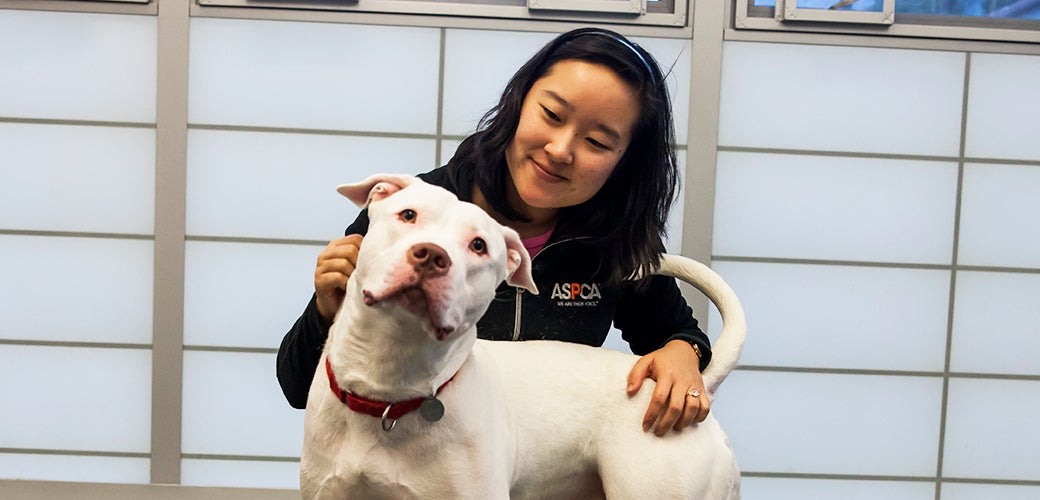Step-by-step guide to working with a board certified veterinary behaviourist
Comprehending the Role of a Veterinary Behaviourist in Pet Training and Well-being
The duty of a vet behaviourist is necessary in resolving the complex connection between pets and their proprietors. They incorporate vet medication with understandings from animal behavior science to take on problems like aggression and anxiousness. Unlike standard fitness instructors, their method concentrates on the underlying reasons of these habits. This nuanced viewpoint elevates concerns about the performance of standard training techniques and how a much deeper understanding can transform pet health. What methods do they employ to attain these results?
What Is a Vet Behaviourist?
A veterinary behaviourist is a specialized expert who concentrates on understanding and attending to the behavior problems of pets, especially pet dogs. Their expertise incorporates veterinary medicine and pet behavior scientific research, allowing them to identify and deal with a large range of behavior problems - veterinary behaviour. These experts frequently hold postgraduate degrees, such as a Master's or PhD in animal actions, and are accredited by pertinent companies, ensuring they have a deep understanding of animal psychology
Veterinary behaviourists examine pets through in-depth monitoring and evaluation, considering aspects such as genes, setting, and training history. They develop tailored habits alteration strategies, which might include desensitization techniques, favorable support techniques, and environmental adjustments. Partnership with family pet proprietors is important, as they supply advice and assistance throughout the training procedure. Ultimately, the goal of a veterinary behaviourist is to enhance the well-being of the animal while fostering a harmonious relationship between pets and their owners.
The Significance of Comprehending Animal Behavior
Understanding animal habits is necessary for both family pet proprietors and professionals in the field of animal care, as it lays the foundation for effective interaction and training. Identifying just how pets regard their setting and reply to stimulations allows caretakers to produce a much more harmonious living situation. Insight right into behavior hints, such as body language and vocalizations, cultivates more powerful bonds in between pet dogs and their proprietors. By appreciating the natural reactions and demands of different species, people can customize their training approaches to fit these factors, advertising much better knowing and collaboration. Additionally, a strong grasp of behavioral scientific research aids in identifying stress factors and possible triggers, allowing for proactive interventions. Overall, understanding animal behavior not just improves the well-being of pet dogs but also improves the experiences of those that look after them, eventually bring about much healthier, happier connections.
Typical Behavioral Issues Attended To by Veterinary Behaviourists
Veterinary behaviourists often deal with typical behavioral problems in pets, consisting of aggression and concern responses. They additionally concentrate on stress and anxiety and stress administration, which can significantly affect a pet's well-being. Recognizing these issues is crucial for developing efficient training and treatment techniques.
Hostility and Fear Reactions
While lots of pet owners might watch aggression and concern responses as straightforward behavior issues, these complicated responses often come from underlying stress and anxiety or previous injury. Vet behaviourists play a vital function in recognizing the origin of these behaviors, which can materialize in different kinds, consisting of growling, attacking, or too much fear of particular scenarios. Comprehending these triggers is essential for creating reliable training strategies tailored to each pet's unique situations. Behaviourists utilize techniques such as desensitization and counter-conditioning to assist family pets manage their concerns and hostility. Furthermore, they inform animal owners regarding suitable administration methods, highlighting the significance of persistence and uniformity. Addressing aggression and fear feedbacks not just enhances the pet dog's quality of life but likewise strengthens the bond between pet dog and proprietor.
Anxiousness and Stress Management
Anxiousness and tension are common problems that many pets encounter, often arising from modifications in their atmosphere, lack of socialization, or previous adverse experiences. Veterinary behaviourists play an essential duty in determining the underlying reasons for these concerns. They utilize various strategies, including behavioral alteration, desensitization, and counter-conditioning, to assist pets manage anxiousness. Furthermore, they may advise environmental adjustments, such as producing secure areas or providing enrichment tasks that promote leisure. Collaboration with family pet owners is necessary, as behaviourists direct them in recognizing their family pet's signals and implementing efficient coping strategies. By attending to anxiety and stress, vet behaviourists add significantly to boosting the overall health and lifestyle for family pets and their family members.
Exactly How Vet Behaviourists Vary From Conventional Fitness Instructors
Vet behaviourists differ from conventional instructors primarily in their academic histories and training. While typical trainers usually concentrate on obedience and fundamental commands, vet behaviourists stress understanding and addressing underlying behavioral problems, including clinical factors to consider into their method. This unique emphasis permits them to offer a much more thorough treatment for family pets with intricate behavior challenges.
Education and Training Differences
Comprehending the distinction between vet behaviourists and traditional instructors is essential for family pet proprietors seeking reliable training services. Vet behaviourists possess postgraduate degrees in veterinary medicine, often complied with by specialized training in animal behavior. This education and learning outfits them to address complex behavioral problems that may stem from clinical problems or emotional aspects. On the other hand, standard fitness instructors commonly have qualifications from training programs that concentrate on obedience and fundamental commands without delving right into the underlying psychological or medical aspects. While both professionals intend to boost pet dog practices, veterinary behaviourists can identify and deal with behavioural issues holistically, integrating medical expertise right into training strategies. This critical difference highlights the relevance of choosing the right specialist based upon the animal's details demands.
Concentrate On Behavioral Issues
Addressing behavioral problems requires a nuanced technique that differentiates veterinary behaviourists from typical fitness instructors. While traditional instructors commonly focus on obedience and standard commands, veterinary behaviourists discover deeper right into the underlying reasons for problematic behaviors. They employ a considerable understanding of animal psychology and behavior adjustment techniques, which are rooted in clinical research. This proficiency allows them to determine issues coming from anxiety, fear, or aggression, rather than just resolving surface-level signs and symptoms. In enhancement, veterinary behaviourists evaluate the family pet's general well-being, thinking about environmental elements and the pet's background. By integrating medical expertise with behavioural techniques, they give customized services that promote lasting behavioral change, guaranteeing both the family pet's and proprietor's lifestyle are substantially improved.
Medical Factors To Consider Consisted Of
While traditional fitness instructors might ignore hidden clinical problems, veterinary behaviourists focus on a thorough evaluation of a pet's health as a foundational action in dealing with behavioural troubles. This strategy enables them to determine prospective clinical problems that may add to unwanted practices, such as anxiousness, discomfort, or neurological disorders. By integrating clinical analyses into their technique, veterinary behaviourists can work together with veterinarians to ensure an all natural understanding of the pet's health. Furthermore, they can recommend ideal therapies or adjustments to training strategies based on medical findings. This comprehensive point of view identifies vet behaviourists from standard fitness instructors, as they address both behavioral and health-related elements, ultimately causing extra effective and lasting outcomes for pet dogs and their owners.

The Refine of Dealing With a Veterinary Behaviourist
Collaborating with a vet behaviourist includes an organized approach to dealing with a family pet's behavioral issues. The process starts with a comprehensive assessment, where the behaviourist gathers thorough details concerning the pet dog's history, setting, and particular actions that are troublesome. This commonly consists of questionnaires, meetings with the pet this hyperlink dog owner, and often observations of the family pet in its setting.
Adhering to the evaluation, the veterinary behaviourist creates a tailored intervention plan that might include behavioral modification methods, training strategies, and, if necessary, sites recommendations for medical evaluations. board certified veterinary behaviourist. The strategy is created to be practical and attainable, ensuring that it fits seamlessly into the animal proprietor's way of life
Succeeding follow-up sessions are vital to monitor development, readjust approaches, and offer support. This joint initiative not only aims to customize undesirable actions however likewise to boost the total wellness of the pet dog, guaranteeing an unified partnership in between the family pet and its owner.
Enhancing Your Pet's Quality of Life With Behavioral Support
Enhancing a pet's lifestyle via behavioral assistance is vital for promoting a healthy and balanced and fulfilling relationship in between pets and their owners (canine behaviourist near me). Veterinary behaviourists play a crucial role in determining and attending to behavioral concerns that may impede a pet dog's well-being. Through customized methods, they assist reduce anxiousness, worry, and aggression, inevitably advertising a more well balanced and satisfied animal
Behavior assistance encompasses various methods, consisting of favorable reinforcement, environmental enrichment, and socialization. By applying these strategies, owners can produce a caring setting that urges favorable behaviors. This not only improves the family pet's psychological wellness but also strengthens the bond between family pet and proprietor.
In addition, normal assessments with a veterinary behaviourist guarantee that any emerging behavioral concerns are quickly attended to, protecting against rise. Overall, purchasing behavioral assistance is an aggressive strategy that greatly improves a pet dog's life, bring about boosted physical and psychological health and wellness results.
Often Asked Questions
What Qualifications Do Veterinary Behaviourists Have?
Vet behaviourists normally hold a veterinary degree, followed by specialized training in pet actions. Lots of likewise possess certifications from recognized companies, showing their proficiency in addressing pet actions problems and promoting total pet wellness.
Can Veterinary Behaviourists Suggest Medicine for Animals?


Veterinary behaviourists, having veterinary levels read the article and specialized training, can indeed suggest medication for pets. This ability enables them to resolve underlying behavioral problems efficiently, commonly incorporating medicinal treatment with behavior adjustment techniques for ideal end results.
For How Long Does Behavior Modification Generally Take?
Behavior therapy duration varies significantly, typically ranging from a few weeks to a number of months. Aspects affecting this timeline consist of the pet's particular problems, uniformity of training, and the proprietor's involvement while doing so.
Are Remote Consultations Available With Veterinary Behaviourists?

How Much Does a Vet Behaviourist Appointment Expense?
The expense of a vet behaviourist examination usually ranges from $100 to $300, relying on aspects such as place, experience, and session length. Added costs might get follow-up appointments or specialized solutions.